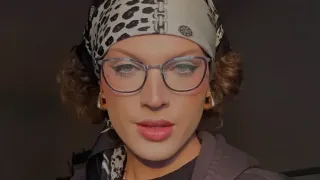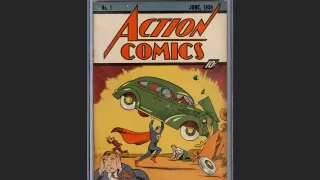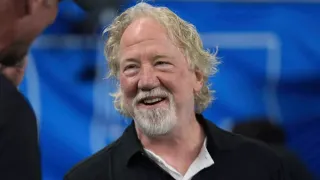January 11, 2018
Playwright Robert O'Hara: the Man Behind the Provocative 'Mankind'
Frank J. Avella READ TIME: 11 MIN.
Robert O'Hara is one of the most audacious and exciting playwrights working today. He's unapologetically honest and decidedly daring in his work. In 2014, he shook audiences up with his semi-autobiographical, wickedly funny play "Booty Candy," presented by Playwrights Horizons, which put a spotlight on black culture's inherent homophobia.
O'Hara is back at PH with "Mankind" a bracing and ballsy new work where the very first scene, titled, "Fuckmate" begins as follows:
Two Men Stand in the Night.
Jason: "Dude, we have to talk."
Mark: "...Now?"
Jason: "There's something I have to tell you."
Mark: "...Ok."
Jason: "Dude, I'm pregnant."
And he is not joking. Jason (Bobby Moreno) and Mark (Anson Mount) have not known each other very long and decide to abort the child. The only problem is that abortion is illegal. Wait, you're wondering how men are getting pregnant by other men? Well, see, there are no more women. The play is set in a dystopian future where women have become extinct - and before you cry misogyny, mankind is not the better for it.
All of that is just the tipping point for a smart and scathing satire that raises stakes at a breakneck pace.
O'Hara masterfully blends comedy, drama, romance and science fiction and whips it up in a dizzyingly fast-paced black comedy that never relents in challenging the audience.
EDGE recently spoke with the dynamic O'Hara on the eve of the play's opening.
Telling a Good Yarn
EDGE: This play is so timely with the patriarchy in the trenches trying to fight to remain in power. In "Mankind" men are the victors, and yet, the presence of women overwhelms. The piece is very female-centric despite the lack of female characters.
Robert O'Hara: I think that sometimes absence is the actual topic, so the removal of half the population becomes the conversation. So everything that's happening in the play is seen through the lens of the removal of the female population, which is the patriarchy's own doing. So now they only have themselves to work with and to blame.
EDGE: You sure know how to keep the momentum going. Too often in provocative pieces a playwright blows his wad in Act One. You use that money shot as simply prologue and keep upping the ante.
Robert O'Hara: (Laughs) I'm interested in telling a good yarn, a good story. So I'm not particularly interested in the minutiae, like what are they eating or how are their clothes being made. For instance, we don't know how men are getting pregnant - what has changed their bodies. I'm not interested in that. I'm interested in what's going to happen next. I'm trying to be ahead of the audience as much as possible because I think satire works if audiences don't see the big potholes of plot that are laying below them as they move through the stories. And before they can actually answer a question you give them another question.
Who Is Dominant?
EDGE: I appreciated how the play was mindful that these men weren't necessarily gay per se, it's simply the way things had evolved.
Robert O'Hara: Right. If you have all men there's no such thing as gay. It's just sexuality; every type of behavior is simply male behavior. I know people who watch the play [and wonder] who is dominant and who's a sub? And who is going to be pregnant and who cannot get pregnant? And I avoid those questions.
EDGE: In addition to satire, you blend sci-fi, comedy, drama, romance - walking that fine line and it works.
Robert O'Hara: It's also very divisive. Whenever you deal with abortion or patriarchy or religion or feminism, you have people who are going to get their collar up. I love it because, inevitably, someone's going to be offended. That's what's beautiful about the play. I like that it has a divisive quality because I think our country is divisive on a lot of different topics and yet we still exist together in the same space.
EDGE: In the past, you liken your work to a speeding train. Do you care if some audience members jump to their death instead of remaining on the journey?
Robert O'Hara: (Laughs) If you can't take it then get off the train! I have left several trains at intermission. And it's not because I didn't like the ride. But I've been on this train before or I'm a little tired. Or I don't like it. But that's your choice. What you do not have is the choice of, 'Can you stop and take me to my house? Can you slow down because I'm a little bit afraid? Can you hurry up because I'm late?' You don't have that power. You have to ride the train or get off. But you can't dictate the route that it's going to take.
Director vs. Writer
EDGE: What inspired you to write "Mankind?"
Robert O'Hara: My partner and I had been talking about having a baby. We had this relaxed relationship to it. We could have a kid or not have a kid. We could adopt or do artificial insemination - all these different conversations. But we would never have the choice to say, 'Hey, I'm pregnant.' And I thought, isn't that interesting because what happens after one says, 'Hey, I'm pregnant,' can be devastating or exhilarating or can change the entire nature of a relationship. So I wanted to explore that with two men. And then what if you make a choice that society says you can't make? That's when the play took off. I think that it was really a satire on patriarchy that became a satire on the way we live right now.
EDGE: As both writer and director I'm curious, does the director demand much of the writer and does the writer sometimes disagree with the director?
Robert O'Hara: The writer sometimes challenges the director: I want to see what you're going to do with this. How are you going to do this part? And the director doesn't really enter the room until after the writer has gotten all of his angst out and then he comes in and goes, 'Wait a second, how the hell am I supposed to do this?'
Working With Actors
EDGE: What's your process like working with the actors? Freedom, rigidity or a combo?
Robert O'Hara: I think that you should have as much freedom as possible but you need to show me what's on the page first. You have to invest in 'yes.' I say that all the time as a director. First, invest in yes. Don't look at the play and say 'I don't understand this' or 'I don't know how this is going to work.' Go with 'I'm going to try this.' Sometimes people come in and sit at a table and say, 'oh, this won't work' and they change it. I don't like that. I like to show the playwright what they have written when I'm directing my own work and when I'm directing other people's work. Then we can talk in a very particular way about how to develop it further.
EDGE: Can you speak to selecting your cast?
Robert O'Hara: When it came auditioning I knew that I wanted to have as full a world as possible so I didn't want anyone to really look alike... I wanted it to have a cavalcade feeling to it. One of the first people I thought of was Andr� De Shields, who is a whole world unto himself. And he's able to deliver the absurd in a way that is not only hilarious but real. I wanted people who would be able to [play] the satire in a serious way because for me it's not a bunch of people running around trying to be funny, it's a bunch of people running around trying to be deadly serious while saying ridiculous and absurd things. These six actors actually bought in very early and that was very exciting - they started to see each other doing things and began to calibrate their behavior so that everyone was in the same play.
His Legacy
EDGE: As a gay man and as a black man do you feel we're moving towards a more inclusive place in theatre, film and TV?
Robert O'Hara: I think we're having more conversations about it but I don't know if it's moving as fast as one would like. I have been in rooms with nothing but white people and they have seen the room as being incredibly diverse because there are different ages, genders, different economic levels, different styles - and that to them is wonderfully diverse. But, to me, I still see a lot of white people in the room and two or three people of color. There is more diversity and inclusivity but I don't think it's making its way fast enough in terms of race. And not just what stories are being told but who is telling the story. I look at Playwrights Horizons, which is an incredibly diverse place in their storytelling but there are five other white playwrights and I'm the only black playwright of the season. So I see that picture and while I'm very happy and humbled to be up there, I still see that there's a long way to go. There should be more than just one person of color on that marquee.
EDGE: As an out, black artist do you see it as part of your job to create characters that are gay and black?
Robert O'Hara: I think that it's part of my job to create a legacy and career. If I'm going to write about what I know then I'm going to need people in the industry to actually want to play those characters. I have a play, for instance, that requires an all-black cast, except for one person, and two people have to be lovers. If I don't speak about the need for that type of diversity then there will be no people to do my work. So I'm trying to create a legacy for not only myself so the work can live on after me, but also for others to see themselves onstage. I have to continue to write roles that are going to speak to people who look and sound and love like I do.
His Coming Out
EDGE: Can you speak a bit about your own coming out?
Robert O'Hara: That's so funny to me because it's been so long. (Laughs) Like, that's what we did? We came out? People are coming out now at like 12! What the what? I was still pretending I could catch a ball at 12! (Laughs) There are two ways of coming out. There's coming out to yourself and there's coming out to the rest of the world. I think I came out to myself fairly early although I didn't accept it. I knew that I was not masturbating to women or girls. I knew that my crushes were on boys and men. When I got to college and I was able to interact with people who were gay, I finally accepted it in myself and immediately wrote my parents and told them. So it was in college that I was not only out but also became a feminist because I had these wonderful mentors who introduced me to Bell Hooks and Audre Lorde and allowed me to be more of who I was.
EDGE: You mentioned mentors and George C. Wolfe was one of your mentors; how did that come about?
Robert O'Hara: I went to graduate school at Columbia University School of the Arts and there is an internship requirement, so I wrote to George because he was doing "Angels in America" at the time - saying I would love to work with him at the Public Theater. He had just taken over, so I became an intern in his office and then, eventually, his assistant and then an artist-in-residence at the Public. It was very formative for me. There were not many African-Americans of his stature, especially running a major institution and someone who was an out homosexual as well. And I always admired his work, so it was a dream come true. He was an idol of mine. It was sort of surreal and also rather difficult because all mentors and mentees clash at certain times, especially if you're trying to be an artist on your own. George was a wonderful mentor but it was not easy. It was not lovey-dovey, rub you on the head and give you a hero cookie. It was hard knocks. And that actually taught me a lot about the rest of the world. It's a very, very difficult and harsh reality to be an artist, especially in New York.
"Mankind" continues through January 28 at the Mainstage Theater, Playwrights Horizons, 416 West 42 Street, New York, NY. For more information, visit the Playwrights Horizon's website.






